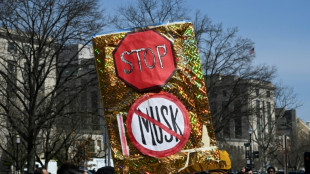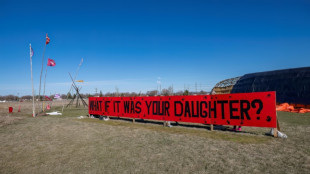

Incoming UK prime minister Truss faces a country in crisis
The UK's new prime minister, Liz Truss, takes power following a "summer of discontent" and as Britons tighten their belts in response to double-digit inflation and soaring energy costs.
"We have a historically huge shock to the cost of living and incomes," said James Smith, research director of the Resolution Foundation think-tank.
"The next prime minister will have to focus on the current crisis from day one."
Workers from refuse collectors to lawyers have for several months been joining picket lines to push for higher pay.
The strikes have won widespread support but at the same time infuriated some people caught up in train cancellations, overflowing bins and empty shelves.
The industrial unrest comes as drought in England and Wales, exacerbated by climate change, has parched crops, sparked wildfires and caused trees to shed leaves early.
But many households are already shivering in anticipation of a winter of massively hiked energy prices.
"It's summertime in the UK but the living is anything but easy," quipped the Financial Times.
"Almost nothing seems to be working in Britain," wrote The Economist magazine, adding: "It could get worse".
- Inflation impact -
The Office for National Statistics this month said its consumer price index had risen 10.1 percent in the year since July 2021, the highest jump in 40 years.
The cost of food and non-alcoholic drinks has risen most sharply, with the biggest price hikes basic foods such as milk, cheese and yoghurts.
This comes as inflation has created the steepest fall in real-term wages in two decades, hitting those on lower incomes the worst.
"These price rises have made the country worse off and many or all of us will ultimately lose out as a result," said the respected Institute for Fiscal Studies (IFS) think-tank.
In a sign of growing poverty, the number of children eligible for free school meals is up almost 1.9 million since 2021.
- 'Real hardship' -
Meanwhile, the UK energy regulator is shortly to allow suppliers to charge consumers vastly more, to reflect high global wholesale prices.
The UK has some of the least energy efficient and oldest homes in Europe and a slow rollout of green technology such as heat pumps.
High bills will hit people across society but particularly those on low incomes with high energy needs, said Smith of the Resolution foundation, citing large families and people with disabilities.
"I think we are going to see real hardship and even destitution," he warned.
The poorest in Britain often use pre-payment meters, meaning they cannot spread energy costs across the year.
The Resolution Foundation has proposed a 30-percent discounted "social tariff" for low- to middle-income households.
While Europe is also experiencing a big energy shock and the US is seeing its economy overheat and high inflation, "in a way we've got the worst of both worlds", said Smith.
The University of York has estimated that two-thirds of UK households will be in "fuel poverty" by January -- paying over 10 percent of net income on energy.
Experts warn of severe consequences.
"In a matter of weeks, many more parents are going to be facing impossible choices between eating or heating.
"Yet we still do not yet have a plan from the UK government that recognises the urgency or scale of this energy price crisis," said Dan Paskins, director of UK Impact at Save the Children.
- Industrial action -
In a "hot strike summer", numerous sectors are demanding pay rises equal to inflation -- rail and bus workers, dockers, postal workers and even criminal lawyers.
In Scotland's capital, Edinburgh, council workers who remove rubbish timed a stinking strike to coincide with the city's globally famous arts festival.
Dockers have walked out at the major container port of Felixstowe, in eastern England, in a move set to hit supply chains.
The rise in strikes has prompted right-wing media to draw parallels with the 1970s, when nationwide strikes were widespread.
The National Institute of Economic and Social Research think-tank stressed, however, that "the strikers in 2022 ... are operating from a position of weakness".
Only about 23 percent of the workforce is now represented by unions, it said.
Due to Brexit, Covid and other factors, the labour market is tight, with fewer workers than jobs.
This has hit sectors such as airports, which let specialised staff go during the Covid pandemic, resulting in long queues for holidaymakers and flights scrapped from schedules.
E.Carlier--JdB



